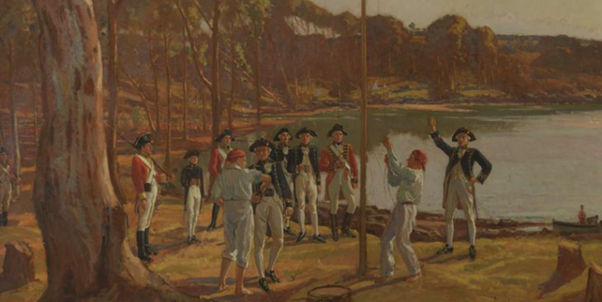The Hand that Unfurled the Flag
Gary L. Sturgess
1/19/20251 min read
Marine Lieutenant William Collins, younger brother of the Judge Advocate David Collins, sailed to Australia with the First Fleet, but was only in the colony for six months, returning on the Friendship in July 1788 due to ill-health. He retired on full pay in 1791 and did not return to active service when war broke out with France two years later. Collins finally passed away in 1842, almost 77 years of age, in the village of Seaton in Devon.
Unsurprisingly, what the family recalled in his obituary was the two years he had spent sailing to and from the Antipodes, and the fact that he had been one of that select group of officers who had gone ashore with Governor Phillip on the 26th of January:
'Died. Sept. 26, at Seaton, aged 77. Lieutenant Wm. Collins, retired full pay R.M., son of Major-General Arthur Tooker Collins, Colonel Commandant Plymouth Division Royal Marines. This officer accompanied Governor Phillips [sic] on the first expedition to New South Wales in 1787; it was his hand that unfurled the first British flag at Sidney Cove [sic]; being invalided home, he was entrusted with the first dispatches from Governor Phillips, &c., - with the last ever received by the Court of France from her celebrated Navigator, Admiral De la Perouse.' [1]
Along with Lieutenant George Johnston, Collins had been chosen by Phillip to lead a party of grenadiers ashore, marines who specialized in amphibious assaults and skirmishing, to secure the landing. He was present that afternoon at the flag-raising ceremony which celebrated the founding of Britain's latest colony.
The story that he had personally unfurled the colours at this ceremony, was previously unknown to Australian historians, and must stand alongside the claim made by George Johnston that he was the first man on shore that day.
____________
[1] Exeter and Plymouth Gazette, 1 October 1842, p.2. This item was republished in the Sydney Morning Herald, 7 March 1843, p.2.


Contact us
Connect with us
Botany Baymen acknowledges the traditional custodians of country throughout Australia and respects their connection to land, water and community.
© Botany Baymen 2024. All rights reserved.
You may download, display, print and reproduce this content for your personal or non-commercial use but only in an unaltered form and with the copyright acknowledged.


